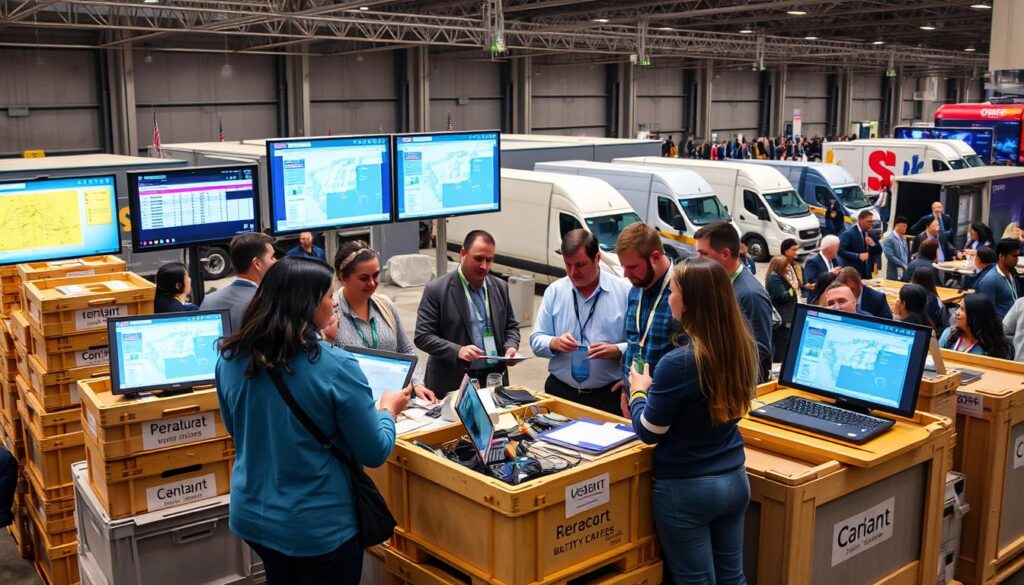Great events don’t happen by accident. They require careful planning and execution. Event logistics is the backbone of any successful gathering. It involves coordinating venues, vendors, resources, and timelines.
This article explores the key elements of event logistics. We’ll share insights and strategies to help planners create unforgettable experiences. Our goal is to guide you in managing every detail effectively.
Key Takeaways
- Comprehensive event planning is the key to successful event logistics
- Venue selection is the foundation of event logistics
- Coordinating transportation, accommodation, and vendor management is crucial
- Effective risk management helps anticipate and mitigate potential issues
- Attention to detail is essential for flawless event execution
Comprehensive Event Planning: The Key to Successful Event Logistics
Successful event logistics start with thorough planning. This involves setting clear event goals and objectives. Organizers must define their target audience and desired outcomes.
Creating a detailed event timeline and checklist is crucial. These tools help keep planning on track and anticipate challenges. They ensure all tasks are completed on time.
Defining Goals and Objectives
Start by clearly outlining your event goals and objectives. Identify your target audience and desired outcomes. Establish key performance indicators (KPIs) to measure success.
Setting these parameters helps organizers make informed decisions. It also allows for effective resource allocation throughout the event process.
Creating a Timeline and Checklist
Develop a detailed event timeline and checklist alongside your goals. The timeline outlines task sequences and deadlines. It keeps the event planning process on schedule.
The checklist serves as a comprehensive guide. It helps identify and complete all necessary event logistics planning tasks.
These elements form the foundation for successful event logistics. They help deliver a seamless and memorable experience for attendees.
Venue Selection: The Foundation of Event Logistics
Choosing the right venue is crucial for event planning. It sets the stage for the entire event logistics. Organizers must evaluate venues based on location, accessibility, capacity, and amenities.
These factors ensure the venue aligns with event requirements. They also help accommodate attendees’ needs effectively.
Evaluating Location and Accessibility
The venue’s location is a key factor. Organizers must check its proximity to airports, train stations, and major highways. They should also consider parking, public transport, and the area’s walkability.
Accessibility is equally important. The venue should cater to attendees with disabilities. This includes features like ramps, elevators, and special seating areas.
Inclusive events comply with accessibility regulations. They also ensure a better experience for all attendees.
| Venue Consideration | Importance |
|---|---|
| Location | Proximity to transportation hubs, ease of access for attendees |
| Accessibility | Accommodations for attendees with disabilities, compliance with regulations |
| Capacity | Ability to comfortably accommodate the expected number of attendees |
| Amenities | Availability of necessary equipment, technology, and support services |
| Logistics | Ease of setup, breakdown, and overall event management |
Careful evaluation of location and accessibility is vital. It ensures a smooth and inclusive experience for all attendees. This approach leads to successful and well-organized events.

Event logistics: Coordinating the Moving Parts
Event logistics involves orchestrating various elements. This includes arranging transportation, accommodations, and managing event vendors. Open communication and collaboration with stakeholders ensure smooth and efficient event execution.
Maintaining a collaborative approach helps address unexpected challenges. It also allows for quick problem-solving during the event.
Transportation and Accommodation Arrangements
Seamless transportation and accommodations are crucial for event participants. This involves researching and securing suitable options like shuttles, rideshares, or local transportation.
Booking appropriate hotel or lodging arrangements is also essential. By addressing attendees’ needs, organizers create a more enjoyable experience.
Vendor Management and Collaboration
Effective vendor management is key to event success. Organizers must carefully select and coordinate with catering services, audio-visual technicians, and event staff.
These vendors should align with the event’s goals and objectives. Open communication among vendors leads to a more cohesive and successful event.
| Event Logistics Aspect | Key Considerations |
|---|---|
| Event Transportation |
|
| Event Accommodations |
|
| Vendor Management |
|
Diligent coordination of event logistics creates a seamless experience for attendees. This includes managing transportation, accommodations, and vendor collaboration.
Attention to detail and a proactive approach are vital. These elements ensure the success of any event logistics operation.

“Effective event logistics coordination is the backbone of a successful event. It requires meticulous planning, open communication, and a collaborative spirit among all stakeholders.”
Risk Management: Anticipating and Mitigating Potential Issues
Event risk management is vital in event planning. It helps deal with unexpected challenges that can pop up at any time. Good event logistics need ways to foresee and reduce possible problems.
Event contingency planning is key. It involves making detailed plans for various scenarios. These plans help organizers act fast when issues arise, keeping the event on track.
Event safety and security are crucial too. This includes access control, emergency plans, and crisis management. Regular safety checks and staff training boost the overall event crisis management approach.
Event troubleshooting skills are a must-have. A team of problem-solvers with the right tools can fix issues quickly. This keeps the event running smoothly.
By planning for risks, organizers create a safe, fun experience. This leaves a good impression and sets up future successes.

“Effective event risk management is the cornerstone of a successful event. It’s not just about planning for the expected, but also anticipating and preparing for the unexpected.”
Conclusion: Embracing Attention to Detail for Flawless Events
Successful events require meticulous attention to detail from start to finish. Event planners can create unforgettable experiences by applying event logistics best practices. Focusing on planning, venue selection, and risk management ensures smooth execution.
Event execution excellence depends on thorough preparation and attention to detail. Clear goals, detailed timelines, and comprehensive checklists are crucial for success. Choosing the right venue and arranging seamless transportation optimize the event experience.
Event professionals must learn from past experiences to improve future events. Anticipating potential issues helps create flawless gatherings that impress attendees. A detail-oriented approach elevates the event experience.
By prioritizing attention to detail, we can establish ourselves as trusted event logistics experts. This commitment ensures memorable events and solidifies our professional reputation. Continuous improvement is key to long-term success in event planning.

